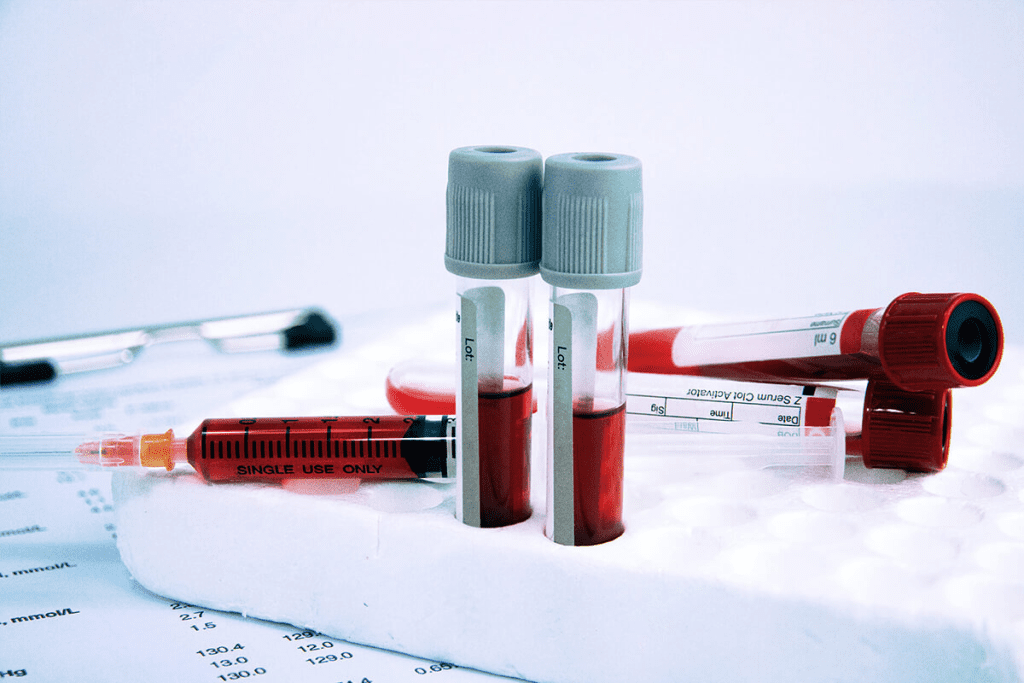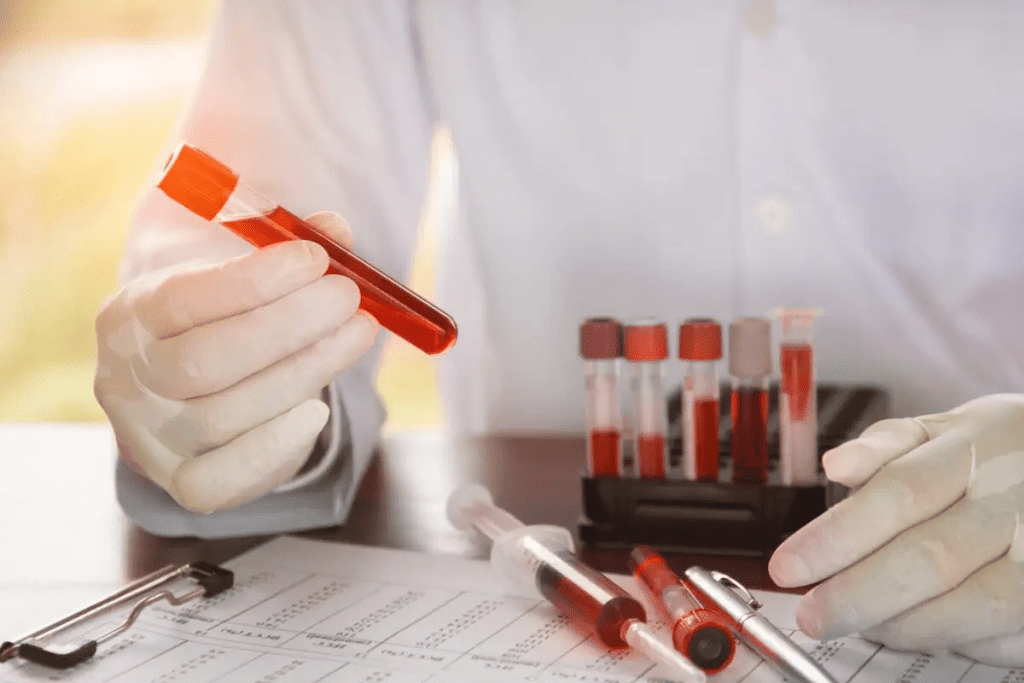
Every year, more than 100 million blood tests are conducted in the U.S., showing their importance in healthcare. Hematology tests are vital for checking health conditions, and understanding how long to fast before blood work is essential to ensure accurate results. Proper preparation helps you get the best and most reliable test outcomes.
Getting a hematology test might seem scary, but knowing what to expect helps. We’ll cover the basics of hematology tests and why they matter for your health.
Knowing about hematology tests and how to get ready is key for patients. Being ready helps make sure test results are right. This lets doctors make better choices for your care.
Key Takeaways
- Understanding the basics of hematology tests
- The significance of hematology tests in health assessment
- Preparation is key to accurate test results
- Being informed can reduce anxiety and stress
- Accurate test results enable informed healthcare decisions
Understanding Hematology Tests and Their Importance
Learning about hematology tests is key to understanding your health. These tests check your blood for many health issues. They are vital for diagnosing and tracking health conditions.
What is a Hematology Test?
A hematology test analyzes your blood to find diseases. It looks for signs of anemia, infections, and leukemia. Hematology tests are essential for checking your health and catching problems early.
Common Types of Blood Tests
There are many blood tests used in hematology. Here are a few:
- Complete Blood Count (CBC): Checks your blood’s parts, like red and white cells and platelets.
- Blood Smear: Looks at blood cells to spot issues like anemia and infections.
- Erythrocyte Sedimentation Rate (ESR): Shows how much inflammation is in your body.
Why Blood Tests Are Essential for Health Assessment
Blood tests are important for checking your health. They give important info about your body. They help in:
- Spotting diseases early
- Tracking how diseases progress
- Seeing if treatments work
Knowing about hematology tests helps us see their role in keeping us healthy. They are key in managing diseases.
How Long to Fast Before Blood Work: Complete Guidelines
Knowing how long to fast before a blood test is key for getting accurate results. Fasting means not eating or drinking anything for a while before the test. How long you need to fast depends on the type of blood test you’re having.
Standard Fasting Times for Different Blood Tests
Each blood test has its own fasting rules. For example:
- Glucose Tests: You usually need to fast for 8-12 hours.
- Lipid Profiles: These tests often require 9-12 hours without food.
- Liver Function Tests: Fasting might be needed, but the time can vary.
Why Fasting Is Necessary for Accurate Results
Fasting is important because it makes sure your test results aren’t affected by what you ate recently. Food can change your blood chemistry, which might make your test results wrong or need retesting.
How Many Hours Should You Fast?
The fasting time varies based on your blood test. Most tests need you to fast for 8 to 12 hours. Always follow what your doctor or the lab tells you.
Overnight Fasting vs. Same-Day Fasting
Many tests require fasting from midnight to morning. But, some tests might need you to fast for just a few hours that day. Whether you fast overnight or for a few hours depends on your test and schedule.
To wrap it up, remember a few things for blood work. Know the test type, fasting time, and follow your doctor’s instructions.
Types of Blood Tests That Require Fasting
Knowing which blood tests need fasting is key for good results. Fasting means not eating or drinking for a set time. Some tests need fasting to get accurate results, free from food or drink effects.
Glucose Tests and Diabetes Screening
Glucose tests help find and track diabetes. Fasting glucose tests check blood sugar after an 8-hour fast. This is vital for diabetes and prediabetes diagnosis.
Lipid Panels and Cholesterol Tests
Lipid panels, like cholesterol tests, need fasting for precise cholesterol and triglyceride levels. You should fast for 9-12 hours before these tests.
Liver Function Tests
Liver function tests (LFTs) check for liver damage or disease. Some LFTs don’t need fasting, but others might. Always follow your doctor’s fasting instructions.
Metabolic Panels
Metabolic panels, basic and complete, often require fasting. They check your health, like glucose, electrolytes, and kidney function.
| Test Type | Fasting Requirement | Purpose |
| Glucose Tests | 8-12 hours | Diagnose and monitor diabetes |
| Lipid Panels | 9-12 hours | Measure cholesterol and triglycerides |
| Liver Function Tests | Variable, sometimes fasting required | Assess liver health |
| Metabolic Panels | Often requires fasting | Evaluate glucose, electrolytes, and kidney function |
Blood Tests That Don’t Require Fasting
Some blood tests don’t need fasting, making them easier for patients. This is great for those with tight schedules or who can’t fast for long.
Complete Blood Count (CBC)
A Complete Blood Count (CBC) doesn’t need fasting. It checks the blood for red and white cells, hemoglobin, and platelets. It helps find issues like anemia or infections.
Is Fasting Necessary for CBC Test?
No, fasting is not needed for a CBC test. You can eat and drink as usual before it. The CBC helps see how well your body fights off infections and carries oxygen.
Thyroid Function Tests
Thyroid function tests also don’t need fasting. They check thyroid hormone levels to spot problems like hypothyroidism or hyperthyroidism.
Other Non-Fasting Blood Tests
Other tests like those for infections, inflammation, or tumor markers usually don’t need fasting. Always listen to your healthcare provider’s instructions. They might change based on the test and your health.
Can You Drink Water Before a Fasting Blood Test?
Many people wonder if they can drink water before a fasting blood test. Drinking water is usually okay, but it’s important to know the rules. This can affect your test results.
Water Consumption Guidelines
For most fasting blood tests, drinking water is allowed. But, the rules can change based on the test and your doctor’s advice. Always follow what your doctor or the lab tells you.
Plain water is usually okay, but coffee, tea, or juice are not. If you’re not sure, ask your doctor.
Impact of Water on Test Results
Drinking water before a blood test usually doesn’t change the results. Staying hydrated is good for your health and makes the blood draw easier. But, too much water can dilute your blood, affecting some tests.
Other Permitted Fluids
Only water is usually allowed before a blood test. Black coffee or tea can start digestion and mess with test results. If you take medicine, ask your doctor if you should take it with water.
Staying Hydrated While Fasting
It’s important to stay hydrated, even when fasting for a blood test. Water helps prevent dizziness or fainting. Drink water until your test, but follow your doctor’s advice.
Knowing the rules about drinking water before a fasting blood test can reduce stress. Always talk to your doctor if you’re unsure about how to prepare for your test.
What to Avoid Before Blood Work
Getting ready for blood tests is more than just going to the lab. You need to think about what to avoid before you go. Some foods, drinks, and medicines can change your blood test results. Here, we’ll tell you what to skip before getting your blood tested.
Foods to Avoid Before Testing
Some foods can mess with your blood test results. For example, fatty foods can change your lipid levels. Foods full of vitamin K can mess with blood clotting tests. Try to stay away from:
- Fatty meals
- Foods high in sugar
- Vitamin K-rich foods like leafy greens if you’re having a blood clotting test
Beverages to Avoid
Some drinks can also mess with your blood test results. It’s best to avoid:
- Sugary drinks
- Caffeine
- Alcoholic beverages
We’ll talk more about alcohol and caffeine later in this section.
Medications and Supplements Considerations
Some medicines and supplements can mess with your blood test results. Always tell your doctor about any medicines or supplements you take. Common ones to watch out for include:
- Biotic supplements
- Vitamin supplements
- Certain prescription medicines that can affect test results
Alcohol and Caffeine Restrictions
Alcohol and caffeine can both mess with your blood test results. Alcohol can affect liver tests, and caffeine can change your heart rate and blood pressure. Here’s what to do:
| Substance | Recommended Avoidance Time |
| Alcohol | At least 24 hours before testing |
| Caffeine | At least 12 hours before testing |
By avoiding these substances and being careful with your diet and medicines before blood work, you can get more accurate results.
Preparing for Your Blood Test: Day Before Guidelines

Getting ready for a blood test is more than just showing up. It begins the day before. What you eat, drink, and how you feel can change your test results.
Dietary Considerations
What you eat the day before can affect your test results, mainly for fasting tests. It’s best to eat a balanced meal with proteins, healthy fats, and carbs. This keeps your body stable for the test.
If you don’t need to fast, just eat as you normally do. This way, your test results will show your usual health.
What to Eat the Night Before a Cholesterol Test
For cholesterol tests, skip high-fat foods the night before. Choose lean proteins like chicken or fish, and add lots of veggies. Don’t drink too much alcohol as it can raise your triglycerides.
Hydration Recommendations
Drinking water is key to make your veins easier to find. Drink lots of water the day before. But don’t drink too much to avoid being too hydrated.
Sleep and Stress Management
Getting enough sleep is important the night before. Try to sleep 7-8 hours to keep your body working well. Also, reduce stress with deep breathing, meditation, or a warm bath. Stress can skew your test results, so relax as much as you can.
By following these tips, you can make sure your blood test results are accurate. This will give you a clear view of your health.
Morning of Your Blood Test: What to Do
On the morning of your blood test, being prepared is key. It helps reduce stress and makes the test go smoothly.
Timing Your Appointment
Think about the time of your blood test. For most tests, the time doesn’t affect the results. But, some tests need a morning appointment for fasting or prep.
Ask your healthcare provider about any timing needs for your test. This helps you plan your morning and get ready for the appointment.
What to Wear for Easy Vein Access
Choosing the right clothes is important for your blood test. Wear clothes that let you easily access your veins, usually in your arm.
- Wear short-sleeved shirts or loose-fitting clothes that can roll up easily.
- Avoid tight clothes that might make it hard to find your veins.
- Wear layers for comfort, as the room might be too hot or cold.
Managing Medications
If you take medications, talk to your healthcare provider about them. Some might need to be taken with food, while others should wait until after the test.
“It’s always best to consult with your healthcare provider regarding any medications you’re taking and how they might impact your blood test results.”
” Medical Professional Guidelines
Bringing Necessary Documentation
Don’t forget to bring all needed documents for your blood test.
| Document | Description |
| Identification | Government-issued ID to verify your identity. |
| Insurance Cards | Your health insurance cards, if applicable. |
| Test Requisition Form | The form provided by your healthcare provider, detailing the tests to be performed. |
Being prepared and bringing the right documents helps your blood test go smoothly. It ensures your results are processed correctly.
Exercise Before Blood Tests: What You Need to Know
Exercise can change your blood test results. It’s important to plan your workouts around blood tests. Knowing how exercise affects your blood work helps get accurate results.
How Exercise Affects Blood Test Results
Exercise can change what’s in your blood. For example, it can change your sugar levels and cholesterol. Intensive exercise can also change your blood temporarily, affecting test results.
After hard exercise, your body might release enzymes into your blood. This can be mistaken for muscle damage. Also, glucose levels can change after exercise, which can affect diabetes tests.
Timing Exercise Around Blood Tests
To avoid affecting your blood test results, plan your workouts. It’s best to not do hard exercise for 24 hours before your test. But, this can change based on the test you’re having.
- Avoid intense workouts on the day before and the day of the blood test.
- Light to moderate exercise might not affect results much, but check with your doctor.
- Some tests need longer rest times before testing.
Types of Tests Most Affected by Exercise
Some blood tests are more affected by exercise than others. These include:
| Test Type | Potential Impact of Exercise |
| Glucose Tests | Exercise can lower blood glucose levels, potentially affecting diabetes screening results. |
| Lipid Profiles | Recent exercise can alter lipid levels, potentially changing cholesterol test outcomes. |
| Liver Function Tests | Strenuous exercise might affect certain liver enzymes, potentially influencing test results. |
How Long to Wait to Exercise After Blood Drawn

You can usually start exercising again after feeling better from the blood draw. This is usually about 30 minutes to an hour. But, if you had a big blood draw or feel sick, wait longer.
Always talk to your doctor about exercising before and after blood tests. This is true if you have health concerns or are getting special tests.
During the Blood Draw: Tips for a Smooth Experience
Many people feel anxious about blood draws. But knowing what happens can make it less scary. Talking to the phlebotomist and getting ready can make the experience better.
Communicating with Your Phlebotomist
Talking to your phlebotomist is key. Tell them if you’re nervous or have had trouble before. Asking questions can also help you feel more at ease.
Techniques to Reduce Anxiety and Pain
There are ways to make blood draws less stressful. Try deep breathing, look away from the needle, and stay calm. A cold compress or numbing cream might also help with pain.
What to Do If You Feel Faint
If you often feel faint, tell your phlebotomist. They might have you lie down or take other steps. If you start to feel faint, speak up right away.
Blood Test Procedure: What to Expect
Knowing what happens can help you relax. The phlebotomist will:
- Clean the area where the needle will be inserted
- Apply a tourniquet to make the veins more accessible
- Insert the needle into a vein and collect the required blood sample
- Remove the needle and apply pressure to the puncture site to stop any bleeding
| Step | Description |
| 1 | Area cleaning |
| 2 | Tourniquet application |
| 3 | Needle insertion and blood collection |
| 4 | Needle removal and applying pressure |
Being ready and knowing what happens can lower your anxiety. This makes the blood draw easier to handle.
After Your Blood Test: Recovery and Next Steps
After your blood test, taking care of yourself is key. It helps you feel better and get back to normal quickly. We know blood tests can be scary, but with the right advice, you can handle any side effects.
Post-Test Eating Recommendations
It’s a good idea to eat something after your blood test. This helps keep your blood sugar stable. Try to eat a meal that has protein, carbs, and fats. This can prevent you from feeling dizzy.
Eating Tips:
- Have a nutritious meal or snack within 15-30 minutes after your blood test.
- Choose foods that are easy to digest, like fruits, nuts, or energy bars.
- Avoid heavy or greasy foods that can cause discomfort.
What to Eat After Blood Test
Good snacks after a blood test include:
- Fresh fruits like bananas or apples.
- Nuts and seeds, such as almonds or pumpkin seeds.
- Protein-rich foods like energy bars or yogurt.
Managing Side Effects
Most people don’t have big side effects, but some might feel dizzy or have bruising. To deal with these:
- Apply gentle pressure to the needle site for a few minutes after the test.
- Elevate your arm to reduce bruising.
- If you feel dizzy, sit or lie down until the feeling passes.
When to Resume Normal Activities
You can usually go back to your normal activities right after a blood test. But if you’re feeling uncomfortable, take it easy for the day. Your healthcare provider might have other advice.
Medical experts say, “Proper post-test care is key to avoiding side effects and recovering well.” Taking the right steps after your blood test can really help how you feel.
Understanding Your Blood Test Results
It’s important to understand your blood test results to know your health status. Blood tests give valuable info about your body’s health. They help find and track health issues.
Normal Ranges and What They Mean
Blood test results show a number and a range. This range tells if your result is normal, high, or low. Normal ranges come from healthy people’s data. But, ranges can differ between labs.
We look at your age, sex, and health history when checking your results. This helps us see if they’re healthy.
How to Read Lab Reports
Lab reports can seem hard, but they’re easier when broken down. A report usually has:
- Patient info and test details
- Test results with reference ranges
- Flags for abnormal results
- Guidelines for what the results mean
When you read your report, focus on any flagged results. Talk about them with your doctor.
How Long for Blood Test Results
The time to get blood test results varies. It depends on the test and the lab. Usually, results come in a few days.
Turnaround times can be short for urgent tests or longer for complex ones. Your doctor will tell you when to expect your results.
When to Be Concerned About Results
Abnormal results can worry you. But, it’s key to talk to your doctor about them. They’ll explain what they mean and if you need more tests or treatment.
Being proactive means understanding your test results. Then, take action based on what they say.
Special Considerations for Different Populations
Different patient groups, like children and pregnant women, need special care with blood tests. We must tailor our approach to ensure the tests are accurate and safe for them.
Children and Blood Tests
When testing children, we must think about their age, size, and developmental stage. They might need smaller needles and special techniques to avoid pain and anxiety. It’s also important to get enough blood for the tests without stressing the child too much.
A study showed using topical anesthetics and distraction techniques helps reduce pain and anxiety in kids during blood tests.
Elderly Patients
Elderly patients face unique challenges, like fragile veins and the effects of many medications. We need to carefully look at their health to get reliable test results.
Research found that considering their medications and health status is key for accurate diagnoses in the elderly.
| Population | Special Considerations |
| Children | Smaller needle sizes, topical anesthetics, distraction techniques |
| Elderly Patients | Fragile veins, multiple chronic conditions, medication interactions |
| Pregnant Women | Gestational age, glucose screening, blood volume changes |
| Patients with Chronic Conditions | Medication management, disease-specific considerations, monitoring requirements |
Pregnant Women
Pregnant women have blood tests for reasons like glucose screening and health monitoring. We must think about the gestational age and any pregnancy complications when looking at test results.
For example, glucose screening for gestational diabetes usually happens between 24 and 28 weeks. The results are very important for both the mother and the baby.
Patients with Chronic Conditions
People with chronic conditions, like diabetes or hypertension, need careful management during blood tests. We must consider their medications, disease status, and any special monitoring needs to get accurate and useful results.
A study highlighted the importance of tailoring the testing schedule to meet each patient’s needs when managing chronic conditions through regular blood tests.
Common Problems with Blood Tests and How to Avoid Them
Blood tests can face issues like hard veins and contamination. These tests are key for diagnosis. Knowing about these problems can help lessen their effects.
Difficult Veins and Access Issues
Hard veins can make blood draws tough. Dehydration, cold, or unique vein shapes can cause this. To avoid hard veins, drink lots of water and keep the area warm.
Tips for easier vein access:
- Stay hydrated by drinking plenty of water
- Keep the arm warm
- Avoid tight clothing that constricts the arm
Feeling Unwell After Blood Test
Some people feel sick after a blood test. They might feel dizzy or nauseous. This can happen due to stress, pain, or a vasovagal reaction. To feel better, breathe deeply during the test and eat something soon after.
Dizziness After Blood Draw
Dizziness after a blood test is common. It’s usually because of a drop in blood pressure. To avoid dizziness, get up slowly and sit or lie down if you feel faint.
Post-test care:
- Take your time standing up
- Rest for a few minutes if needed
- Stay hydrated
Hemolysis and Sample Contamination
Hemolysis, or red blood cell breakdown, can happen if the blood sample is mishandled. This can make test results wrong. To prevent hemolysis, use the right venipuncture techniques and handle the sample carefully.
Preventing sample contamination:
- Use appropriate venipuncture techniques
- Handle samples gently to avoid hemolysis
- Label samples correctly to avoid mix-ups
By knowing these common problems and how to avoid them, patients can have a better blood testing experience.
Where to Get Blood Work Done: Finding the Right Facility
Patients have many places to get blood work done. The place you choose can affect your experience and test results.
Hospital Labs vs. Independent Facilities
Hospital labs and independent facilities are common choices. Hospital labs have the latest tech and skilled staff. But, they might have long wait times and high costs.
Independent facilities offer quicker service and flexible prices. But, make sure they are certified by a trusted agency.
At-Home Testing Options
At-home testing is growing in popularity. Many companies sell testing kits online. You collect a sample at home and send it to a lab.
At-home testing is convenient and can save you money. But, it’s important to follow the instructions to get accurate results.
Insurance Considerations
Insurance affects the cost of blood work. Check with your provider to see which labs are covered.
- See if your plan has a network for lab tests.
- Find out if there are any costs you’ll have to pay.
- Ask about extra fees for services like venipuncture.
How to Prepare for Different Testing Environments
Preparation is key, no matter where you go. Follow any special instructions, like fasting or avoiding certain meds.
Also, ask questions and clear up any doubts. Being prepared helps make the testing process smoother.
Conclusion: Ensuring Successful Blood Tests Every Time
Getting ready and knowing how blood tests work can make them more successful. We’ve covered many topics, like what hematology tests are and why they matter. We also talked about how to prepare for your test and what your results mean.
Being well-prepared is essential for good blood test results. This means knowing what test you’re getting, following any fasting or diet rules, and knowing how meds or supplements might affect your results. Learning about your health helps you be more involved in your care.
By using the tips from this article, you can make sure your blood tests go well. We stress how important it is to learn about your tests. Don’t hesitate to ask your doctor if you have any questions or doubts.
FAQ
How long should I fast before blood work?
The fasting time varies by blood test type. Usually, you should fast for 8-12 hours. But, some tests might need a longer or shorter fast.
Can I drink water before a fasting blood test?
Yes, drinking water is okay and even encouraged before a fasting blood test. It helps keep you hydrated.
What types of blood tests require fasting?
Tests that often need fasting include glucose tests, lipid panels, liver function tests, and metabolic panels.
Do I need to fast for a CBC blood test?
No, fasting is not needed for a Complete Blood Count (CBC) test.
What should I avoid eating before a blood test?
Avoid fatty or greasy foods, too much sugar, and caffeine before a blood test. This ensures your results are accurate.
Can I exercise before a blood test?
Avoid hard exercise for at least 24 hours before a blood test. It can affect some test results.
How long does it take to get blood test results?
Results time varies by test type and lab. Usually, you’ll get them in a few hours to a few days.
What should I eat after a blood test?
Eat a balanced meal or snack after a blood test. It helps replenish energy and prevents dizziness.
How can I reduce anxiety during a blood test?
Talk to your phlebotomist, use relaxation techniques, and be prepared. These can help lower anxiety during a blood test.
What are the common problems associated with blood tests?
Issues include hard veins, feeling sick after the test, dizziness, and sample contamination.
Where can I get blood work done?
You can get blood work at hospital labs, independent facilities, or at home. It depends on your insurance and preferences.
How can I prepare for a blood test?
Follow fasting guidelines, stay hydrated, avoid certain foods and drinks, and manage your medications as advised.
What should I wear for a blood test?
Wear clothes that let you easily access your veins. A short-sleeved shirt or loose-fitting top works best.
Can I take my medications before a blood test?
Talk to your healthcare provider about your medications before a blood test. Some might need to be adjusted or avoided.
How long should I wait to exercise after a blood test?
Wait at least 30 minutes to an hour after a blood test before exercising hard.
References
Kaufman, K. R., et al. (2009). Preparation for blood tests: what can go wrong before the sample is even collected? Annals of Clinical Biochemistry, 46(3), 201-204.






